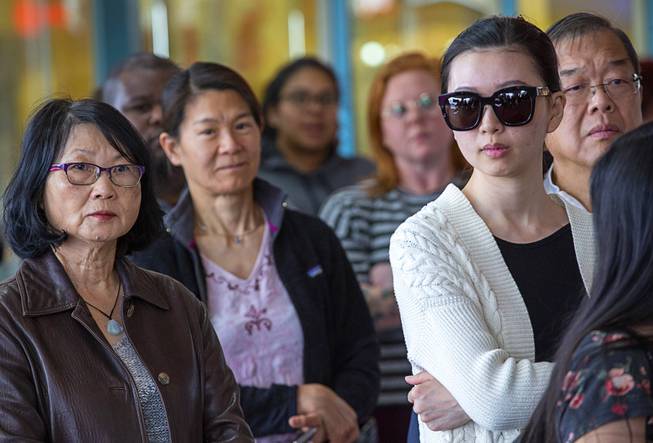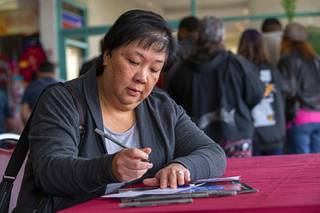
Voters wait in line to cast ballots at the Chinatown Mall on the first day of early voting for the Nevada 2020 caucus Saturday, Feb. 15, 2020.
Tuesday, Feb. 18, 2020 | 2 a.m.
Related Content
Christian Bato is all too familiar with the narrative that Asian Americans and Pacific Islanders are “politically apathetic.” The notion plagues the already marginalized group, and in the past, has silenced their voices in elections, he said.
The Las Vegas resident remembers being interested in politics from an early age when his mother and father — both naturalized Filipino Americans — took him with them whenever they voted.
“My father made it clear to me growing up that I was born here and that I’m American,” he said. “I deserve to be here and I should use my voice to stand up.”
Bato is a volunteer with the Asian American & Pacific Islander Democratic Caucus, a grassroots organization with the purpose of engaging eligible voters who are Asian Americans or Pacific Islanders and electing candidates to best serve the demographic.
In Nevada, there are 202,091 eligible Asian Americans and Pacific Islanders voters, as the group’s population has increased 167% to 334,763 since 2000, the group reports. Sixty-one-percent of all eligible Asian Americans and Pacific Islanders voters in Nevada live in Clark County.
Bato said candidates haven’t always aggressively courted Asian American and Pacific Islander voters, despite the group being the fastest-growing demographic in Nevada and making up 10% of the state’s electorate. More than 70% of Asian and American registered voters said they weren’t contacted by campaigns or outreach groups during the 2016 election cycle, compared to 58% of African American and 56% of white voters, according to the 2016 Post-Election National Asian American Survey.
Swing state attention
Asian Americans have the lowest rate of civic participation, just under Latino voters, according to the Pew Research Center. Language and cultural barriers contribute in the lack outreach, causing Asian Americans and Pacific Islanders voters to either be under informed or totally unaware of the political process entirely, said Karthick Ramakrishnan, a University of California, Riverside political science professor who conducts surveys on Asian Americans and Pacific Islanders voters.
They are also at a geographic disadvantage, with a high concentration of them living in states that vote late in the primary and generally go blue anyway. Nevada, a battleground state in past elections and with a high Asian Americans and Pacific Islanders population, is an exception.
“In 2012 and 2016, there was good Republican and Democratic investment, and a fair amount of energy in Nevada because it was a swing state,” he said. “That has meant more attention to the (Asian Americans and Pacific Islanders population) community in Nevada than say states like California.”
Asian Americans and Pacific Islanders population voters are also becoming increasingly aligned as Democrats, Ramakrishnan said, but this wasn’t always the case. In 1992, the majority voted for George H.W. Bush, creating the impression they were a more conservative, affluent demographic than other minorities. There was a significant shift 20 years later though when in 2012, 77% of the demographic voted for Barack Obama.
Although Asian Americans and Pacific Islander voters tend to be less to the left than African American voters, Democratic Party candidates still are attractive to them, with 65% choosing Hillary Clinton over Donald Trump in the 2016 election.
Asian Americans and Pacific Islanders voters aren’t a monolith though, Ramakrishnan notes, as they represent a wide range of ethnicities and cultures. Indian Americans for example tend to lean more left while Vietnamese Americans tend to be more conservative.
Ramakrishnan expects Asian American and Pacific Islander voters to play an important role in the Democratic race in 2020 this year, particularly in Nevada as they make up a significant voting bloc of the state, which has prompted the party to pay more attention to it. Some of the same issues important to all Americans also resonate with Asian Americans, of which 13% in Nevada lack health insurance and 10% live in poverty, the group reports.
“What has changed is a greater awareness of the Asian American community and what it takes to reach out,” he said. “They can make a difference.”
State Democrats pay heed
The Nevada Democratic Party “took a long hard look” at the state’s voter demographics when developing outreach strategies, bringing early voting caucus sites to areas that may have previously been left out of the process, spokeswoman Molly Forgey said.
There was an early voting site in Chinatown Plaza this year and changes to caucus training material to included Tagalog, to cater to Filipino Americans, who represent the most significant Asian Americans and Pacific Islanders in the state. Campaigns have also been front and center at various local cultural events, including Chinese New Year in the Desert.
Bato said AAPI Democratic Caucus has also enhanced its outreach toward individual groups, stressing that Asian Americans and Pacific Islanders don’t vote as a monolith. For example, they organized a mock caucus last month, where participants could caucus for their favorite foods like Vietnamese banh mi or Korean kimchi.
While there’s been improvement, Bato said engagement was still a work in progress. For example, he isn’t sure including Tagalog in caucus materials was the best use of resources, as many Filipino Americans already speak English.
“As a son of Filipino immigrants, I appreciate the gesture,” he said. “But there are a whole lot of other ways we could have diversified our resources … maybe hiring an Asian American staffer for example.”
Still, Bato hopes outsiders will recognize the perseverance of not only Asian Americans and Pacific Islanders voters in Nevada, but the diversity of the state as a whole.
“The state is a microcosm of America,” he said. If you turn it on its side, it has two coasts, a rural center and everything in between.. I believe in my heart we will be a force in this caucus and election.”

